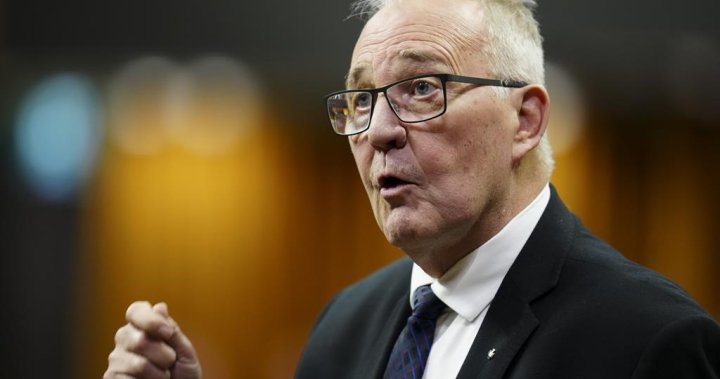Defence Minister Bill Blair unveiled Monday $7.9 billion in new spending on the Canadian Armed Forces over the next five years in a long-promised update to Canada’s defence policy, but this will still not meet the country’s target under NATO.
By the end of the new five-year plan in the 2029-30 fiscal year, Canada is expected to be spending 1.76 per cent of GDP on defence, still below the NATO target of two per cent of GDP, according to the policy update document.
The first major defence policy update since 2017 says the Canadian Armed Forces (CAF) need to address three major factors that are reshaping the world stage: climate change disproportionately changing Canada’s Arctic; autocracies and disruptive states like Russia challenging the international order; and new technologies “rapidly redefining” conflict.
The total budgeted spend in this five-year plan is $8.1 billion, with $157 million of this being funds reallocated from the last defence policy update in 2017.
In the upcoming April 16 federal budget, defence spending is set to rise by $612 million, growing incrementally by $500 million for the next two years, and then by about $300 million for the final two years, as outlined in the update.

The bulk of this year’s new spending is focused on sustaining naval vessels and other military equipment, budgeted at $495 million.
While the NATO GDP target is not expected to be met, the policy document says Canada is “on track to exceed” the NATO target of putting 20 per cent of defence spending into major equipment expenditures.
Military leadership including, Chief of the Defence Staff Gen. Wayne Eyre and Vice-Admiral Angus Topshee, have publicly spoken about the need to better maintain key military equipment, including frigates, to ensure operational readiness.
Recruitment is a continuing challenge for the CAF as well, with officials saying they are approximately 15,000 people short. They characterize recruitment criteria as “outdated,” and they are looking at creating a probationary period to speed up the recruitment process.
The email you need for the day’s
top news stories from Canada and around the world.
Last month, Blair said the CAF is facing a “death spiral” on recruitment issues.
Other recruitment initiatives include re-evaluating medical requirements, focusing recruitment efforts on people with skilled trades, and establishing a strategy to rehabilitate military housing.
Among the new spending priorities outlined in the strategy this fiscal year are $73 million for intelligence and cyber operations, $15 million for ammunition purchases and production, $13 million for childcare for CAF personnel, $10 million to the NATO innovation fund and $7 million for a health record platform.
This is all separate from previously announced military spending, including commitments to NORAD modernization and the purchase of F-35 fighter jets.
The government says the spending plan over the next 20 years is valued at an additional $73 billion to ensure a “ready, resilient and relevant” CAF.
The document characterizes asserting Canadian sovereignty in the Arctic as the “most urgent and important task” faced by the CAF amid a changing geopolitical and physical landscape thanks to climate change.
As polar ice melts and key areas like the Northwest Passage become more accessible, the defence policy update discusses both Russia and China working to increase a military presence in the Arctic, specifically naval capabilities.

The policy update outlines a plan for a greater Canadian emphasis on building up a greater military presence and mobility in the Arctic to deal with “disasters, threats and challenges to our sovereignty.”
A strategic goal is to ensure these waters, land and airspace aren’t vulnerable to intrusion that could harm Canadian or American interests as the melting ice could open new shipping routes between Europe and East Asia, the policy document says.
In addition to climate change and shifting geopolitical powers impacting real world CAF operations, new technological innovations in artificial intelligence and quantum computing are changing the role of cyberspace in conflict.
To address this, the CAF plans on establishing a Cyber Command and work with the Communications Security Establishment to create joint Canadian cyber operations capabilities.
According to the policy document, this will enable the military to “generate and employ cyber forces and other specialized capabilities on short notice.” It notes that all operations would have to be approved by the government on a mission-by-mission basis.
The policy document says, “AI will fundamentally transform conventional military warfare,” with changing tactics like the ability for state and non-state actors to employ targeted disinformation campaigns, espionage and foreign interference.
On the flip side, the CAF sees AI as a tool that can be employed to accelerate decision making and identify trends through the use of autonomous systems, according to the document.
Over the course of the five-year plan, the CAF plans on spending $917 million on enhancing intelligence and cyber operations, growing to $2.8 billion over the next 20 years.
© 2024 Global News, a division of Corus Entertainment Inc.




